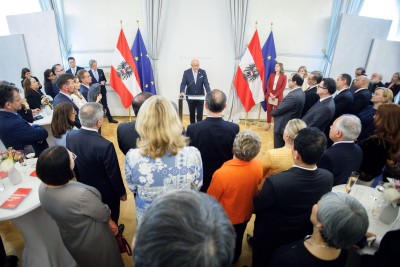In the historic congress hall of the Federal Chancellery, a place that was the scene of the Congress of Vienna in 1815, which reorganized Europe, the Austrian government welcomed the diplomatic corps on Tuesday. In his speech, Chancellor Christian Stocker emphasized the non-negotiable cornerstones of the new government: the rule of law, separation of powers, human and minority rights, independent media, and a clear commitment to EU membership and compliance with international law and the UN Charter.
Stocker emphasized that Austria is and will remain a reliable and constructive partner at the international and European level. He underscored the importance of diplomacy in today’s world: “Especially today, in a world shaken by war and increasing uncertainty, diplomacy is more important than ever.” The work of diplomats goes beyond simply representing their countries; it builds trust and opens channels of communication, which is invaluable for global peace and stability.
A year of anniversaries and looking ahead
The reception also provided an opportunity to commemorate several important milestones and anniversaries for Austria. Chancellor Stocker recalled the 80th anniversary of the end of World War II in Europe and the liberation from National Socialism, the 70th anniversary of the signing of the Austrian State Treaty, and 30 years of Austria’s membership in the European Union. This year also marks the 70th anniversary of Austria’s accession to the United Nations. “Austria is and remains a consistent promoter of multilateral cooperation,” said Stocker, who thanked the diplomats present for their commitment.
Vienna: Hub of diplomacy and candidate for the UN Security Council
In her speech, Foreign Minister Beate Meinl-Reisinger highlighted Vienna’s role as an international center of diplomacy. With over 16,000 diplomats and international experts, Vienna is a “city of dialogue” and makes Austria a reliable partner in global issues. Given global crises, Meinl-Reisinger emphasized: “We are doing everything we can to ensure that it is not the law of the strongest that prevails, but the strength of the law.” In this context, she reaffirmed Austria’s candidacy for a non-permanent seat on the UN Security Council for the years 2027/28 and asked for support.
Minister for Europe and Family Affairs Claudia Plakolm emphasized the government’s pro-European orientation and its commitment to actively shaping the common future at the EU and international levels. She stressed that the advantages of 30 years of EU membership should not be taken for granted. Plakolm underscored the importance of open communication in diplomacy: “Sometimes dialogue is difficult and can even be painful. But there is no substitute for open communication. It is the backbone of good diplomatic and political work.” She assured those present of the Austrian government’s willingness to cooperate, even when interests differ.
